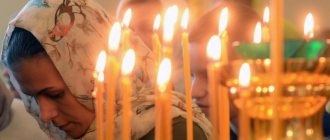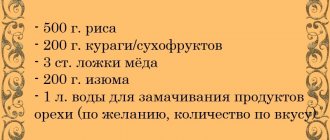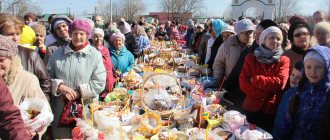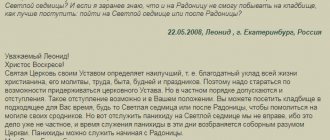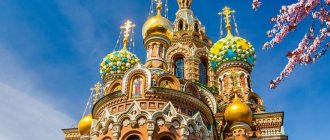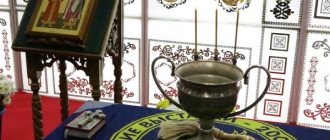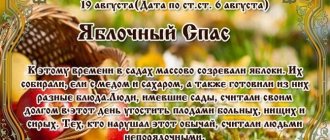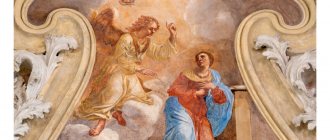This term has other meanings, see Monthly Words (meanings).
Months
(Old Russian mѣsѧseslov, mѣsѧsoslov [1], erroneous tracing paper from (Old Greek μηνολόγιον = Old Greek μήν - “month” + Old Greek λέγω - “collect”), and not from ancient Greek λόγιον - “word” [2] or
saints
- a church calendar indicating the days of remembrance of saints, the annual circle of church holidays, or a folk calendar, indicating traditions, rituals and signs of the day. In Orthodoxy, it is part of such liturgical books , as a missal, apostle, menaion and typikon; may also contain indications of the features of the service on a given day.
The Typikon contains a separate chapter “On the signs of the holidays of the month” which indicates: “ It is appropriate to know that the holidays are divided into great, medium and small
».
Table of holiday ranks
Explanatory table of the categories of holidays in Russian Orthodox monthly books
| Type of holidays | Discharge | Typikon sign | Comments | Examples |
| Great | Vigils | The service is most solemn; an all-night vigil is served. |
| |
| Average | Vigils | An all-night vigil is served with a canon to the Theotokos at Matins. |
| |
| Polyeleaceae | Festive matins are served, with polyeleos, but there is no all-night vigil[3]. |
| ||
| Small | Doxology | The Great Doxology at Matins is sung, not read: hence the name. There is no vigil. |
| |
| Hexadecimal | The name “sixfold service” comes from the Typikon’s instruction to sing the 6th stichera to the saint on “Lord, I have cried” from the Menaion. The saints of these holidays are also called “sixfold”. |
| ||
| Everyday | — | unsigned | Everyday services are not holidays in the proper sense. For completeness, days “without a sign” are added to the 5 above-mentioned categories of holidays. |
|
In Greek Orthodox monthly books, this system of signs is usually absent, only in some there are signs of holiday levels in the form of crosses of various shapes[4].
Parents' Saturdays in 2022, when the Orthodox will have days of remembrance of the dead
According to the Orthodox church calendar, there will be nine memorial days in 2022. These days it is very important to pray for the departed, go to church, give alms and do good deeds.
The Orthodox Church has established the following days of remembrance of the dead in 2022:
- February 26, 2022 - Ecumenical Parents' Saturday (meat-free) - 1st parent's Saturday before Meat-free Week.
- March 19, 2022 - Saturday of the 2nd week of Lent - 2nd Parent's Saturday.
- March 26, 2022 - Saturday of the 3rd week of Lent - 3rd Parent's Saturday.
- April 02, 2022 - Saturday of the 4th week of Lent - 4th parental Saturday.
- May 03, 2022 - Radonitsa, parent's day - Tuesday of the 2nd week of Easter.
- May 09, 2022 - Day of special remembrance of deceased soldiers, which is celebrated on Victory Day. This is the only memorial parental Saturday, the date of which never changes.
- June 11, 2022 - Trinity Parents' Saturday before Trinity.
- October 08, 2022 - Pokrovskaya Saturday.
- November 05, 2022 - Demetrius Parents' Saturday, which is celebrated on the Saturday preceding the day of remembrance of the Great Martyr Demetrius of Thessaloniki.
Notes
- Dictionary of the Russian language, 1982, p. 121.
- [krotov.info/library/01_a/le/kseev_2.htm A. A. Alekseev Textology of the Slavic Bible. § 3. Church calendar]
- The vigil can be “if the abbot wishes”
(Typikon: “if the abbot wishes”). - A. A. Lukashevich
[www.pravenc.ru/text/199923.html Signs of the holidays of the month] // Orthodox encyclopedia. Volume XX. - M.: Church-scientific, 2009. - P. 268-271. — 752 p. — 39,000 copies. — ISBN 978-5-89572-036-3
MONTHWORDS
MONTHS (tracing paper of the Greek word μηνολόγιον), 1) a calendar-ordered system of Christian holidays, commemorations of saints, sacred and historical memories. events. This system is a synthesis of several ancient liturgical systems. traditions. Their most archaic. layer is presented in Greek. manuscripts of the pre-iconoclastic period of the Palestine-Sinai region, as well as those translated from Greek. language other cargo and other Armenian monuments. Relatively complete hymnographic manuscripts from the Palestine-Sinai region date back to no earlier than the 8th century. (for example, Byzantine. Tropology of the younger variety), other cargo. and other Armenian monuments reflect the state of the liturgical. traditions 4th–7th centuries
Thanks to the liturgical reform carried out in Constantinople in the 8th century. 9th centuries and usually associated with the activities of the monks of the Studite monastery, in Byzantium. In the capital's liturgy, there was a synthesis of Constantinople monastic and cathedral, as well as Palestinian liturgical traditions. This contributed to the formation of the Constantinople erorthology. core - the most stable complex of the most important holidays of the Orthodox Church, which was reflected in the Synaxar of Constantinople and served as the basis for the formation of the M. service Menaions. This complex of holidays had local varieties: Palestinian-Sinaitic, Italo-Greek (which is characterized by the presence of holidays dedicated to the saints of Italy). The most ancient glory. M. (late 9th – early 10th centuries) is characterized in addition to a small number of glories. memory (for example, Saints Cyril and Methodius) presence means. number of “Western” memories (St. Apollinaris of Ravenna, Martyr Vitus, Martyr Erasmus, St. Martin of Tours, Martyr Stephen I, Pope of Rome). In the 10th–11th centuries. in connection with the “Byzantinization” of glories. worship and its gradual orientation towards Constantinople models brought M. glories closer together. service Menaion with the liturgical practice of the Constantinople monasteries. The unification of M. is especially noticeable from the 14th century. in connection with the spread of the Jerusalem liturgical charter (monastic Typikon), based on the Studite tradition and enriched with some Palestinian features.
In the beginning. 21st century the Orthodox world uses a single M., based on the Jerusalem Charter; Moreover, in each local Church there are local memories, which are reflected in liturgical books and in church calendars published by these churches.
2) A collection of abbreviated lives of saints. In Byzantine manuscripts. and Slavic-Russian. Along with the lives of M., local holidays and other things were mentioned. historical events: military victories, enemy invasions, founding of cities, consecration of churches, as well as natural disasters. With the spread of the Jerusalem Charter and later with the development of printing, the content of M. was gradually unified. In Russia in the 1st half. 18th century a complete M. was created, in which the memories of saints from various church books are collected (Prologue, Chetyih-Menya, Typikon, Followed Psalter, Saints). From the 18th century M. were published in mass editions and became widespread in all levels of society. In the 19th century innovations in Moscow were considered by a special commission under the Synod.
Links
Wiktionary has an entry for "monthwords"
Type of life Life-martyrium • Life-biography Collections Cheti-Minea • Prologue • Patericon • Synaxarion • Aismavurk Apocryphal genres Legend • Walking • Vision • Word • Gospel Related Articles Menaea • Months
Russian agricultural calendar (Mesyatseslov)
However, the substantive basis of calendars is the mythological interpretation of time, the distinction between sacred, pure, good and unclean, evil, dangerous time, which is reflected in the language (in the names of holidays, revered and dangerous days and periods) [1].Folk calendars have been preserved mainly in oral form, partly also in the form of handwritten lists of holidays; All Slavs also used primitive wooden calendars (tags, cuts, work, Bulgarian chetuli, Polish karby), on which the dates of holidays and important events were indicated by notches. Individual Slavic traditions reveal significant differences in the composition, correlation, interpretation, evaluation and terminology of the units of time that make up the folk calendar [1].
The southern and eastern Slavs are, in a sense, the successors of the Western Asian tradition of counting the new year from the beginning of spring or from the date of the vernal equinox [2]. (From Wikipedia)
The starry sky is Svarga
, called
the Wheel of Svarog
.
It is fortified at the Polar Star or Sedava Star
, on
Stozhar-Stlyaz
- the celestial axis. It revolves around Stozhar in one day and makes a revolution in a year. The slowest rotation, known only to the sages, lasts about 27 thousand years. And this rotation leads to the fact that the zodiacal constellations, visible at the moment of the spring equinox in the North, slowly replace each other. This time is called the Day of Svarog. They are divided into twelve zodiac eras, each of which lasts just over two thousand years. The sun moves along the solar path belt and passes over one zodiacal era from one zodiac sign to another. Now we live in the fierce era of Pisces, the era of Roof-Aquarius is approaching. Calculates the duration of eras and the duration of the Days of Svarog, the god of time and astrologers - Chislobog.
Almost all holidays and everyday life coincide with the life cycle of the Earth and its movement among the stars, so celebrating days according to the old calendar is an introduction to nature, bringing into your life the feeling that the Earth is alive. Even if you do not celebrate these days, but simply remember them, the youth, maturity and old age of our Mother will already pass before a person. For thousands of years, calendars have served people, helping them to cultivate the land, harvest crops, hunt and fish on time. The year, divided into twelve parts, was depicted on ritual bowls, embroideries, and each month had a special sign. The annual wheel - Kolo Svarog - carried a special meaning, which consisted in the eternal rebirth and renewal of all living things.
Below are Russian holidays with Christian names superimposed. The date is given at the time of the adoption of the calendar in 45 BC. In brackets: the first date according to the civil (Julian) calendar of the early 20th century is the old style, the second date according to the modern calendar of the Russian Orthodox Church is the new style. Some signs probably correspond to the dates of the 16th century calendar (see V. Vlasov “Russian calendar style”).
An excerpt characterizing the Monthly Words
“Give me your hand,” he said, and, turning it so as to feel his pulse, he said: “You’re not well, my dear.” Think about what you are saying. Kutuzov on Poklonnaya Hill, six miles from the Dorogomilovskaya outpost, got out of the carriage and sat down on a bench at the edge of the road. A huge crowd of generals gathered around him. Count Rastopchin, having arrived from Moscow, joined them. This whole brilliant society, divided into several circles, talked among themselves about the advantages and disadvantages of the position, about the position of the troops, about the proposed plans, about the state of Moscow, and about military issues in general. Everyone felt that although they had not been called to this, although it was not called that, it was a council of war. The conversations were all kept in the area of general issues. If anyone reported or learned personal news, it was said in a whisper, and they immediately went back to general questions: no jokes, no laughter, no smiles were even noticeable between all these people. Everyone, obviously with effort, tried to stay at the height of the situation. And all the groups, talking among themselves, tried to stay close to the commander-in-chief (whose shop was the center in these circles) and spoke so that he could hear them. The commander-in-chief listened and sometimes asked questions about what was being said around him, but he himself did not enter into the conversation and did not express any opinion. For the most part, after listening to the conversation of some circle, he turned away with a look of disappointment - as if they were not talking about what he wanted to know. Some spoke about the chosen position, criticizing not so much the position itself as the mental abilities of those who chose it; others argued that a mistake had been made earlier, that the battle should have been fought on the third day; still others talked about the Battle of Salamanca, which the Frenchman Crosard, who had just arrived in a Spanish uniform, told about. (This Frenchman, together with one of the German princes who served in the Russian army, dealt with the siege of Saragossa, foreseeing the opportunity to also defend Moscow.) In the fourth circle, Count Rastopchin said that he and the Moscow squad were ready to die under the walls of the capital, but that everything yet he cannot help but regret the uncertainty in which he was left, and that if he had known this before, things would have been different... The fifth, showing the depth of their strategic considerations, talked about the direction that the troops would have to take. The sixth spoke complete nonsense. Kutuzov's face became more and more concerned and sadder. From all the conversations of these Kutuzov saw one thing: there was no physical possibility of defending Moscow in the full meaning of these words, that is, it was not possible to such an extent that if some crazy commander-in-chief had given the order to give battle, then confusion would have occurred and the battles would have all it wouldn't have happened; it would not have been because all the top leaders not only recognized this position as impossible, but in their conversations they discussed only what would happen after the undoubted abandonment of this position. How could commanders lead their troops on a battlefield they considered impossible? The lower commanders, even the soldiers (who also reason), also recognized the position as impossible and therefore could not go to fight with the certainty of defeat. If Bennigsen insisted on defending this position and others were still discussing it, then this question no longer mattered in itself, but mattered only as a pretext for dispute and intrigue. Kutuzov understood this. Bennigsen, having chosen a position, ardently exposing his Russian patriotism (which Kutuzov could not listen to without wincing), insisted on the defense of Moscow. Kutuzov saw Bennigsen’s goal as clear as day: if the defense failed, to blame Kutuzov, who brought the troops to the Vorobyovy Gory without a battle, and if successful, to attribute it to himself; in case of refusal, to clear oneself of the crime of leaving Moscow. But this question of intrigue did not occupy the old man’s mind now. One terrible question occupied him. And he did not hear an answer to this question from anyone. The question for him now was only this: “Did I really allow Napoleon to reach Moscow, and when did I do it? When was this decided? Was it really yesterday, when I sent an order to Platov to retreat, or the evening of the third day, when I dozed off and ordered Bennigsen to give orders? Or even before?.. but when, when was this terrible matter decided? Moscow must be abandoned. The troops must retreat, and this order must be given.” To give this terrible order seemed to him the same thing as giving up command of the army. And not only did he love power, got used to it (the honor given to Prince Prozorovsky, under whom he was in Turkey, teased him), he was convinced that the salvation of Russia was destined for him and that only because, against the will of the sovereign and by the will of the people, he was elected commander-in-chief. He was convinced that he alone, even in these difficult conditions, could remain at the head of the army, that he alone in the whole world was able to know the invincible Napoleon as his opponent without horror; and he was horrified at the thought of the order he was about to give. But something had to be decided, it was necessary to stop these conversations around him, which were beginning to take on too free a character. He called the senior generals to him. “Ma tete fut elle bonne ou mauvaise, n'a qu'a s'aider d'elle meme, [Is my head good or bad, but there is no one else to rely on," he said, getting up from the bench, and drove off in Fili, where his crews were stationed.
Traditions and prohibitions of memorial days among Orthodox Christians
In the old days, it was customary to eat kutya on parental Saturdays - an obligatory dish for a funeral meal. Sweet porridge is prepared from whole grains of wheat or other cereals with the addition of honey, as well as raisins or nuts. Now the believers have moved away from this tradition. In the modern world, only visiting a temple, praying for the deceased, and visiting cemeteries have remained unchanged.
What can and cannot be done on Parents' Saturday for the Orthodox
- On parent's Saturday morning you need to go to church, light candles for the repose and order a prayer service for the dead.
- On this day, priests conduct funeral Divine Liturgies, and after them - general memorial services.
- After the church service, you need to go to the cemetery, after which you can serve a modest funeral dinner at home.
- On parent's Saturdays you cannot have fun, celebrate holidays, listen to music or dance.
